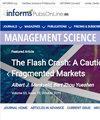A Theoretical Extension of the Technology Acceptance Model: Four Longitudinal Field Studies
IF 4.6
2区 管理学
Q1 MANAGEMENT
引用次数: 18173
Abstract
The present research develops and tests a theoretical extension of the Technology Acceptance Model (TAM) that explains perceived usefulness and usage intentions in terms of social influence and cognitive instrumental processes. The extended model, referred to as TAM2, was tested using longitudinal data collected regarding four different systems at four organizations ( N = 156), two involving voluntary usage and two involving mandatory usage. Model constructs were measured at three points in time at each organization: preimplementation, one month postimplementation, and three months postimplementation. The extended model was strongly supported for all four organizations at all three points of measurement, accounting for 40%--60% of the variance in usefulness perceptions and 34%--52% of the variance in usage intentions. Both social influence processes (subjective norm, voluntariness, and image) and cognitive instrumental processes (job relevance, output quality, result demonstrability, and perceived ease of use) significantly influenced user acceptance. These findings advance theory and contribute to the foundation for future research aimed at improving our understanding of user adoption behavior.技术接受模型的理论拓展:四个纵向领域研究
本研究开发并测试了技术接受模型(TAM)的理论延伸,该模型从社会影响和认知工具过程的角度解释了感知有用性和使用意图。扩展模型称为TAM2,使用收集的纵向数据对四个组织(N = 156)的四个不同系统进行了测试,其中两个涉及自愿使用,两个涉及强制使用。在每个组织的三个时间点测量模型构建:实施前、实施后一个月和实施后三个月。扩展模型在所有四个组织的所有三个测量点上都得到了强有力的支持,在有用性感知方面占40%- 60%的差异,在使用意图方面占34%- 52%的差异。社会影响过程(主观规范、自愿性和形象)和认知工具过程(工作相关性、输出质量、结果可论证性和感知易用性)都显著影响用户接受度。这些发现促进了理论的发展,并为未来的研究奠定了基础,旨在提高我们对用户采用行为的理解。
本文章由计算机程序翻译,如有差异,请以英文原文为准。
求助全文
约1分钟内获得全文
求助全文
来源期刊

Management Science
管理科学-运筹学与管理科学
CiteScore
8.80
自引率
7.40%
发文量
583
审稿时长
15 months
期刊介绍:
Management Science is a scholarly journal that publishes scientific research on the theory and practice of management. The journal includes within its scope all aspects of management related to strategy, entrepreneurship, innovation, technology, and organizations as well as all functional areas of business, such as accounting, finance, information systems, marketing, and operations. The journal includes studies on organizational, managerial, group and individual decision making, from both normative and descriptive perspectives. The articles are primarily based on the foundational disciplines of computer science, economics, mathematics, psychology, sociology, and statistics, but cross-functional, multidisciplinary research that reflects the diversity of the management science professions is also encouraged. The journal interest extends to managerial issues in diverse organizational forms, such as for-profit and nonprofit firms, private and public sector institutions, and formal and informal networks of individuals. We welcome theoretical, experimental (field or lab) and empirical contributions.
The unifying thread of all Management Science articles is an analytical focus on improving the understanding of management. An acceptable manuscript must be relevant to the theory or practice of management, must meet high standards of rigor, and must be of broad interest to the community of management science scholars.
 求助内容:
求助内容: 应助结果提醒方式:
应助结果提醒方式:


